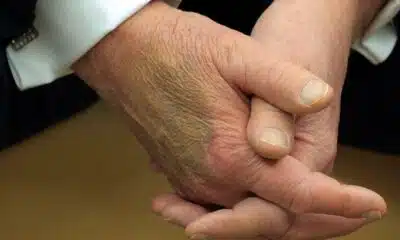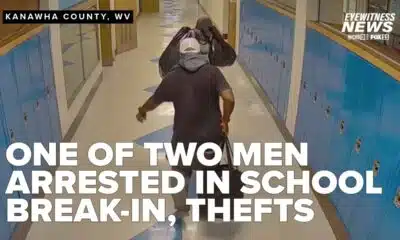News from the South - Tennessee News Feed
Tennessee victim-serving agencies warn cuts will be ‘catastrophic’ if Gov. Bill Lee fails to act
Tennessee victim-serving agencies warn cuts will be ‘catastrophic’ if Gov. Bill Lee fails to act
by Anita Wadhwani, Tennessee Lookout
March 3, 2025
As federal funding for crime victims dwindled in recent years, 35 states across the nation took action to keep domestic violence shelters open, sexual assault centers operating and child abuse counselors available to serve the youngest of victims.
Tennessee was not one of these states.
Now a looming budget crisis threatens the future viability of scores of Tennessee nonprofits that operate hotlines, protect seniors from elder abuse and work with prosecutors to secure evidence against perpetrators of human trafficking.
Collectively these organizations serve more than 95,000 victims in Tennessee each year, according to the state’s Office of Criminal Justice Programs.
“Many states have dedicated victim service funding in their budgets. Tennessee doesn’t,” said Jennifer Escue, executive director of the Tennessee Coalition to End Domestic & Sexual Violence.
“We’re really worried that programs across the state might have to close their doors open. We know they would have to drastically reduce their services,” Escue said. Rural organizations that rely most heavily on the federal funding have fewer private-sector resources to tap, and victims who depend on them will suffer the most, she said.
Escue said victims are facing a “double whammy” in funding losses.
The Victims of Crime Act, or VOCA funding, which relies on the fees and fines collected in federal court, has seen a drastic drop in collections as prosecutors have made a concerted shift to accept more plea deals — a trend that preceded the current Trump Administration.
A short-term infusion of COVID-era funding helped bridge the gap, but those funds have now ended.
In 2018, the federal government distributed more than $67 million to Tennessee’s Office of Criminal Justice Programs, which in turn, gave grants to 128 agencies across the state to serve crime victims.
By 2024, that number had dropped to $16 million.
Advocates are expecting to see up to 40% more in cuts come July from the already slashed federal crime victims fund, a steep loss that could spell the closure of small nonprofits in rural areas that rely on the funding for up to 80% of their budgets.
Last fall, victim-serving agency leaders met with Gov. Bill Lee’s staff to make their case for $25 million in recurring state funding needed to keep organizations’ doors open.
“We received an indication from leadership of the General Assembly and the governor’s office that it was being considered,” said Stephen Woerner, executive director of Tennessee Children’s Advocacy Centers.
But that hope was short-lived. The governor’s budget, unveiled earlier this month, includes no funding for victim organizations.
“We were disappointed,” said Woerner.
Woerner’s organization operates 46 centers across the state that employ specialized counselors who work with children who have been abused, neglected or sexually assaulted.
The counselors conduct forensic interviews designed to prevent further trauma while eliciting information used in prosecuting perpetrators. The counseling continues for the victims and non-offending family members after the abuse has ended. The services are provided free of charge.
Ultimately what we’re going to see happen is victims of crime don’t get the care they need and an increase in cycles of generational crime, and it’s going to make law enforcement’s jobs much more difficult.
– Rachel Freeman, president and CEO, Sexual Assault Center
The organization received $5.5 million annually from the federal crime victims fund at its peak; this year, it received $2.1 million.
“Child advocacy centers will close their doors if we can’t shore this up,” he said. “If a child advocacy center closes, it means that a child is going to have to drive anywhere between an hour and two hours away. That’s step one.”
“It means we have fewer interviews, because families are not able to do that, especially in rural Tennessee. The Department of Children’s Services is going to have a harder time (protecting children). And for district attorneys, fewer interviews means fewer prosecutions.”
Woerner’s organization has joined more than 120 others in issuing dire warnings to Lee and members of the General Assembly that saud without an infusion of $25 million in state funding, “the consequences will be catastrophic.”
“Our shelters, crisis hotlines, and outreach programs are often the only lifelines available. Without stable funding, we face service cuts and closures,” read a letter to lawmakers from the Tennessee Victim Service Providers Alliance, an umbrella group of victim serving organizations hastily formed to advocate for state funding.
The letter noted that many of the services they provide, including sexual assault exams and forensic interviews of children suspected of being abused, were mandated by the General Assembly but included no state funding to carry them out.
Lee this week declined to say whether he will reconsider including funding for victim services in a supplemental budget to be introduced this spring.
“The Tennessee Victim Service Providers Alliance represents key organizations that serve Tennesseans well, and we appreciate their partnership,” a statement from Lee’s office said. “Gov. Lee continues to work with the General Assembly on budget priorities, and the administration’s budget amendment will be finalized in the coming months.”
Rachel Freeman, president and CEO of the Sexual Assault Center in Nashville said her organization is better positioned to raise private sector funds than smaller nonprofits in rural areas lacking resources to make up for funding cuts.
Nevertheless, she said, the ongoing cuts have proved challenging.
About half of the nonprofit organization’s $5 million budget comes from the federal VOCA funding. Freeman is preparing for cuts of between 10% and 40% this year.
Without state dollars, the funding loss will be “disastrous for our state,” she said.
“Ultimately what we’re going to see happen is victims of crime don’t get the care they need and an increase in cycles of generational crime, and it’s going to make law enforcement’s jobs much more difficult,” she said. “That’s a vicious cycle that’s going to be more disastrous for our state.”
The federal funding cuts will also be felt in local government, police departments and district attorney’s offices that provide victim counseling and advocacy.
The Metro Nashville Office of Family Safety lost two of its 12 counselor positions last year as federal funds contracted and expects to lose two more if no state funding is provided, said Diane Lance, director.
The Nashville governmental agency helps victims of interpersonal violence obtain orders of protection, create safety plans for themselves and their children and provides crisis counseling.
“These therapies are for ‘I have been raped,’ ‘my mother was shot and killed by my dad.’ We’re trying to get them through the immediate emergency,” Lance said.
Without state funding, “they’re not going to get the help they need. Already with domestic violence shelters, 40 percent of the time they can’t take you in. And now there’s so many funding cuts you won’t have a crisis advocate. So good luck trying to stay safe for you and your children.”
GET THE MORNING HEADLINES.
Tennessee Lookout is part of States Newsroom, a nonprofit news network supported by grants and a coalition of donors as a 501c(3) public charity. Tennessee Lookout maintains editorial independence. Contact Editor Holly McCall for questions: info@tennesseelookout.com.
The post Tennessee victim-serving agencies warn cuts will be ‘catastrophic’ if Gov. Bill Lee fails to act appeared first on tennesseelookout.com
News from the South - Tennessee News Feed
Intense storms downed power lines, left thousands in the dark across the Mid-South
SUMMARY: Intense storms in southeast Memphis caused 13 power poles to fall along Shelby Drive near Getwell, leaving thousands without power. MLGW and Memphis Police have blocked affected roads due to live power lines posing a significant danger. One downed line even crushed a car, though the driver is expected to be okay. The outages have impacted many homes and businesses in the area amidst extreme heat, complicating recovery efforts. Utility crews are working through the night to clear debris and restore power, with no estimated timeline for repairs yet. Authorities have closed a half-mile stretch of the road for safety.
At least 16 power poles on Shelby Drive were knocked down around 7 p.m. Thursday. And on Friday morning, MLGW crews were …
News from the South - Tennessee News Feed
Alvarado echoes Trump in launching a congressional bid
SUMMARY: Dr. Ralph Alvarado, Kentucky’s first Hispanic state legislator and former Republican state senator, announced his 2026 bid for Kentucky’s 6th Congressional District seat. Now Tennessee’s health commissioner, Alvarado plans to return and align with Trump’s “America First” agenda, focusing on issues like border security and fighting the “woke agenda.” The seat, held by GOP Rep. Andy Barr, is a Democratic target for the 2026 midterms. The race includes GOP challengers Ryan Dotson and Deanna Gordon, and Democrats Zach Dembo, Cherlynn Stevenson, and David Kloiber. The district blends rural GOP areas and Democratic-leaning Lexington, shaped by recent redistricting.
The post Alvarado echoes Trump in launching a congressional bid appeared first on wpln.org
News from the South - Tennessee News Feed
A heart implant could make Tennessee’s next execution painful and prolonged. Prison officials argue they don’t have to disable the device.
SUMMARY: Byron Black, scheduled for execution in Tennessee on August 5, has a heart implant—a combined pacemaker and defibrillator—that could cause severe pain by delivering shocks if triggered during lethal injection. Experts warn that the drug pentobarbital used in the execution may induce dangerous heart rhythms activating the device, causing continuous shocks. Black’s attorneys argue the device should be disabled beforehand, but state officials and medical experts claim it’s unlikely to be triggered and that any shocks would be felt in a coma state, preventing pain perception. A court ruling on this issue is expected soon.
The post A heart implant could make Tennessee’s next execution painful and prolonged. Prison officials argue they don’t have to disable the device. appeared first on wpln.org
-
News from the South - Tennessee News Feed5 days ago
Bread sold at Walmart, Kroger stores in TN, KY recalled over undeclared tree nut
-
News from the South - Arkansas News Feed7 days ago
Man shot and killed in Benton County, near Rogers
-
News from the South - Georgia News Feed1 day ago
Aiken County family fleeing to Mexico due to Trump immigration policies
-
News from the South - Alabama News Feed6 days ago
Girls Hold Lemonade Stand for St. Jude Hospital | July 12, 2025 | News 19 at 10 p.m. – Weekend
-
News from the South - Georgia News Feed7 days ago
Anti-ICE demonstrators march to Beaufort County Sheriff's Office
-
News from the South - Oklahoma News Feed7 days ago
Police say couple had 50+ animals living in home
-
Mississippi Today4 days ago
Coast judge upholds secrecy in politically charged case. Media appeals ruling.
-
Mississippi Today1 day ago
Driver’s license office moves to downtown Jackson









































